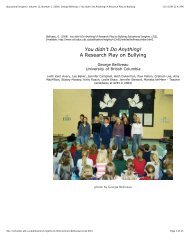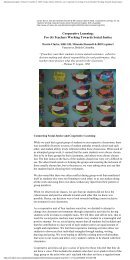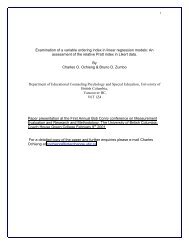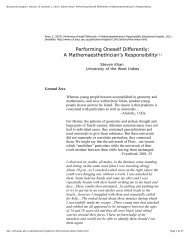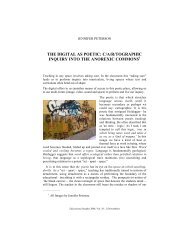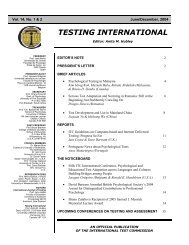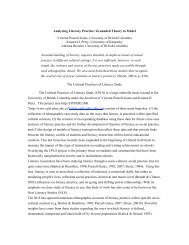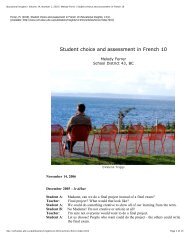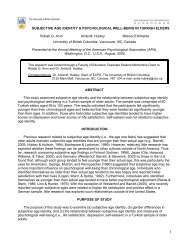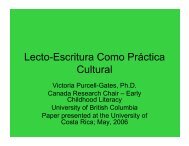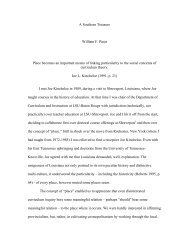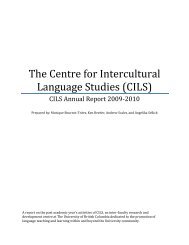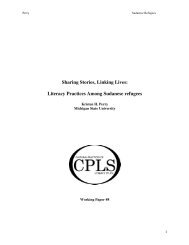The evolution of professionalism - Centre for Policy Studies in ...
The evolution of professionalism - Centre for Policy Studies in ...
The evolution of professionalism - Centre for Policy Studies in ...
You also want an ePaper? Increase the reach of your titles
YUMPU automatically turns print PDFs into web optimized ePapers that Google loves.
<strong>Policy</strong> required all students <strong>in</strong> Grades 5 to 8 to study a second language, which<br />
could <strong>in</strong>clude Punjabi, Mandar<strong>in</strong>, or Japanese. Aborig<strong>in</strong>al education enhancement<br />
agreements were developed <strong>in</strong> 1999. <strong>The</strong> francophone education regulation<br />
<strong>for</strong>malized the entitlement to enrol <strong>in</strong> francophone educational programs.<br />
In 1997, the M<strong>in</strong>istry <strong>of</strong> Education made specifi c suggestions <strong>for</strong> the <strong>in</strong>clusion<br />
<strong>of</strong> multiculturalism and antiracism education <strong>in</strong> school curricula. An English as a<br />
Second Language policy framework was developed <strong>in</strong> 1999 and Diversity <strong>in</strong> BC<br />
Schools: A Framework was developed <strong>in</strong> 2001. Introductory Mandar<strong>in</strong> Ch<strong>in</strong>ese<br />
and Introductory Punjabi are now <strong>of</strong>fered from Grades 5 to 12, and teachers have<br />
<strong>in</strong>tegrated resource packages <strong>for</strong> develop<strong>in</strong>g language skills. While suggestions<br />
<strong>for</strong> curriculum and frameworks were developed prov<strong>in</strong>cially, implement<strong>in</strong>g these<br />
changes relied on <strong>in</strong>dividual school district priorities.<br />
Special education was acknowledged <strong>in</strong> the Royal Commission Report (1988)<br />
and the Commission recommended that the rights <strong>of</strong> learners with special needs<br />
and their parents required clarifi cation. As a result, Policies <strong>in</strong>to Practice <strong>in</strong>itiated<br />
a two-year guidel<strong>in</strong>e development process and an 18-month consultative process<br />
that resulted <strong>in</strong> a framework <strong>for</strong> special education policy (1995), with revised<br />
guidel<strong>in</strong>es <strong>for</strong> practice. A number <strong>of</strong> recommendations was made by a review team<br />
<strong>for</strong> implementation <strong>in</strong> 2001, <strong>in</strong>clud<strong>in</strong>g <strong>in</strong>creased measures <strong>for</strong> <strong>in</strong>tegration and <strong>for</strong><br />
pr<strong>of</strong>essional development.<br />
Alongside these developments, we see the creation <strong>of</strong> the Francophone<br />
Education Authority (CSF: Conseil Scolaire Francophone) by the government<br />
<strong>in</strong> 1998. French education has been available to the francophone community <strong>in</strong><br />
BC s<strong>in</strong>ce 1979, and BC now has the fourth largest student population <strong>in</strong> French<br />
programs <strong>in</strong> Canada. A francophone school board was created <strong>in</strong> 1995 and, <strong>in</strong><br />
1997, the School Amendment Act (Bill 45) recognized the right to French-speak<strong>in</strong>g<br />
education. In 1998, 2,860 students were enrolled <strong>in</strong> francophone education<br />
programs, <strong>of</strong> which 1,800 participated <strong>in</strong> 11 districts governed by the CSF. In 1999,<br />
CSF’s jurisdiction was extended, and it was now entrusted with the management<br />
<strong>of</strong> the French-speak<strong>in</strong>g school programs throughout the prov<strong>in</strong>ce. In spr<strong>in</strong>g 2001,<br />
the Canada/BC General Agreement on the Promotion <strong>of</strong> Offi cial Languages was<br />
signed. <strong>The</strong> agreement provided a mandate <strong>for</strong> the prov<strong>in</strong>cial government to<br />
coord<strong>in</strong>ate activities <strong>for</strong> the benefi t <strong>of</strong> the BC francophone population. Under the<br />
three-year agreement, the federal government provided the prov<strong>in</strong>cial government<br />
with $1,500,000. A Member <strong>of</strong> the Legislative Assembly (MLA) appo<strong>in</strong>tment (i.e.,<br />
MLA responsible <strong>for</strong>) was made to <strong>in</strong>clude and acknowledge the responsibility the<br />
government has <strong>for</strong> francophone affairs.<br />
Education <strong>Policy</strong> was directed toward <strong>in</strong>creas<strong>in</strong>g accountability. It recommended<br />
changes to written report cards, <strong>in</strong>clud<strong>in</strong>g requirements that specifi c types <strong>of</strong><br />
anecdotal as well as quantitative commentary on student progress be <strong>in</strong>cluded <strong>in</strong><br />
these reports. <strong>The</strong>se changes were also implemented as a means to create a more<br />
mean<strong>in</strong>gful dialogue between schools and parents. <strong>The</strong> L<strong>in</strong>k File (1993) was also<br />
created. L<strong>in</strong>k data provided track<strong>in</strong>g mechanisms <strong>for</strong> students <strong>in</strong> the secondary<br />
through to the postsecondary system. <strong>The</strong> L<strong>in</strong>k File claimed to support a more<br />
effi cient use <strong>of</strong> education resources, and suggested that equitable access must be<br />
provided to students to public postsecondary <strong>in</strong>stitutions.<br />
18 Section 1: <strong>The</strong> West



